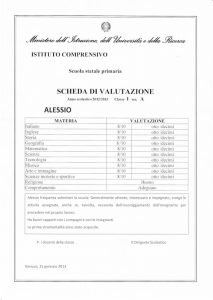Primary school – scuola elementare
All children, Italian and foreign, who turn 6 must go to primary school. Primary school usually lasts 5 years and is the first compulsory school that exists in Italy.
Primary school is the first level of compulsory school for children aged 6 to 11. In Italy, parents are obliged to enroll and send children to school up to the age of 16 at least.
In Italy, public primary school is free for all children, Italian and foreign.
Children usually start primary school at the age of 6. Some parents even decide to enroll their children earlier and get them started at age 5. For special reasons, such as health or other situations, it is possible to delay the start and enroll the child at 7 years old.
Schools are open from September to June, with weekly schedules from Monday to Friday, with half-day (27-30 hours) or full-time (approximately 40 hours) plans. Classes have 15-26 children.
The school calendar and the exact opening and closing times of schools may vary depending on the location. Preschool and after-school classes are also available in many schools to help parents who need more flexible hours.
During the school year and at the end of the year, children receive the report card, also called scheda di valutazione. Report cards are documents that show the child’s academic performance at school. The report cards show the marks for each subject and the teacher’s assessment of the child’s behavior.

In rare cases, the child may fail and have to repeat the class. This can happen when the child has too many difficulties, long absences, or other reasons why teachers decide that it is better for the student to repeat the year.
Schools remain closed in the summer period and working parents usually find other alternatives for a few weeks such as oratories, centers, and summer camps.
Primary school is the first grade of the school path. Here children are taught the main core subjects.
During the first 2 years, children learn to read, write, and do math calculations.
Later, the children study different subjects: Italian, English, history, geography, mathematics, science, music, art, physical education, technology, citizenship and the constitution.
In addition, children can study the Catholic religion. The teaching of the Catholic religion is optional and therefore it is the parents at the beginning of each year who choose whether the child will study this subject or not. Depending on the school, children who opt out can choose between studying an alternative subject decided by the school, self-study, postponed entry to the second hour, or early exit one hour before the regular time.
Public primary school is free, but you will still have expenses to pay. Visit this page, and find more information on the cost of primary school and economic support towards expenses.
Children who study full time and stay all day have lunch at school.
Schools try to offer a balanced and varied diet to offer children different foods during the week: pasta, bread, meat, vegetables and fruit, dairy products, etc.
In the event that the child cannot eat certain foods or ingredients (for intolerances, health reasons, or religious reasons, etc.), it is possible to arrange a special menu with the school. The canteen, in fact, is not only the service given by schools to make children eat, but it is also a space for food education and where children stay together and socialize.
In some schools, it may be possible to bring your own lunch. However, this too must be agreed with the school in advance.
In many cases, registration for the servizio mensa/refezione (lunch service) is automatic and takes place with registration. In other cases, it is necessary to register for the service separately. The cost that each family pays depends on family income.
Children also bring snacks from home, which they usually eat during the early morning break.
Children can miss school for several reasons; when they are sick, when they have doctor visits, family, or other reasons. You must, however, remember to justify the absence by explaining the reason why your child was unable to go to school.
In the case of very long absences, it is advisable to notify the teachers immediately communicating the reason. If the absence is for several days, teachers can also have some study material at home so that the child does not fall too far behind compared to his peers.
In special cases and for urgent reasons, it is also possible for most schools to request late entry or early exit to allow the child to arrive a little later or leave school a little earlier. In this way, the child does not lose the whole day of study.
Useful link
-
Online enrolment
Ministry of education
Go to the link
You might be interested in
-
The cost of public school
See the article -
The school system in Italy
See the article